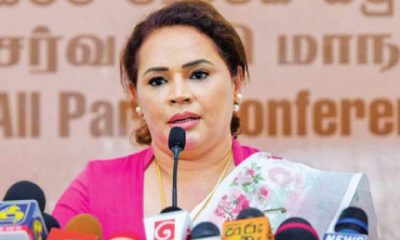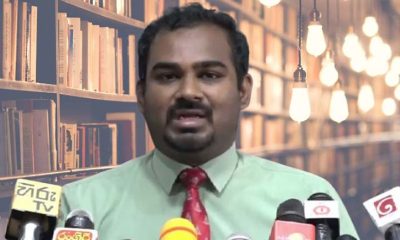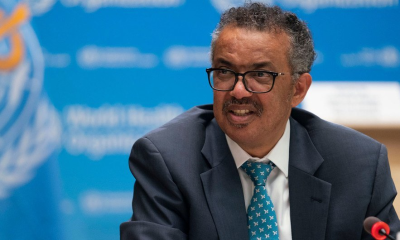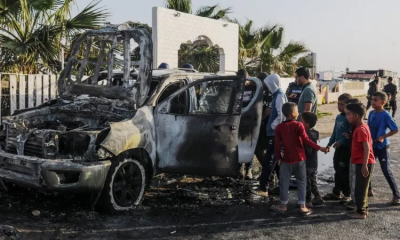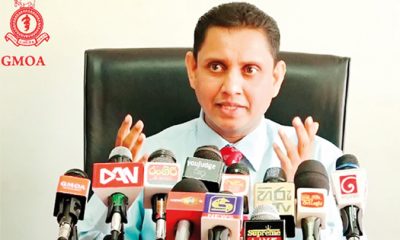News
Average life expectancy of Sri Lankans will drop unless NCDs are controlled

By Nimal Bandara Herath
There will be a drastic reduction in the average life expectancy of Sri Lankans by 2045 if steps are not taken to control Non Communicable Diseases (NCDs), Dr. Sunil Bowattage, consultant physician, Kandy General Hospital, told The Island on Friday.He added that until a few decades ago the world was struggling to contain communicable diseases.
“If you look at Sri Lanka, many died of cholera, smallpox, etc. However, with the advances in medical sciences we have been able to reduce the deaths, by communicable diseases, significantly. This is a main reason why life expectancy went up in the 20th century,” he said.
Dr. Bowattage added that in the past few decades, NCDs have become the main cause of deaths. Due to the prevalence of NCDs, life expectancy, in certain countries, has dropped, he said.
“However, according to the World Health Organization (WHO), we can prevent 2/3 of NCD deaths by taking necessary action.”
Dr. Bowattage said a massive campaign must be carried out by those in power, with the help of the media, to educate the public on NCDs, how to avoid them and how to control them.
“We see many people with heart issues, diabetes, high cholesterol, high blood pressure, obesity and cancers. We must not be afraid of these. Modern science can address most of these. Bad food habits, sedentary lifestyle, obesity, smoking, etc., are the main reasons why people get NCDs. A lot can be achieved with behavioral changes,” he said.
Non-communicable diseases, including diabetes, cardiovascular diseases, strokes and cancers, account for nearly 90 percent of the disease burden in Sri Lanka, according to the World Bank.
A large number of persons, with NCD, are not taking prescribed medicines, due to economic difficulties, and thus hospitals are filling up due to complications, Dr. Palitha Rajapaksha, the assistant secretary of the Government Medical Officers Association (GMOA) says.
There were about three million people, over 60 years, and they were the most affected by NCDs, Dr. Rajapaksha said, adding that Sri Lanka had very weak social safety nets and many were at the risk of being reduced to poverty.
Dr. Rajapaksha added that he was attached to the Provincial General Hospital, Badulla, and that all wards there were full of patients with diabetes, high blood pressure, heart conditions, etc.
“All wards are full. I don’t know what we would do if the number of dengue cases go up. I have been a doctor for many years, but I have never seen such a large number of patients, with NCDs, in hospitals,” he said.
News
US sports envoys to Lanka to champion youth development

The U.S. Embassy in Colombo welcomed the U.S. Sports Envoys to Sri Lanka, former National Basketball Association (NBA) and Women’s National Basketball Association (WNBA) players Stephen Howard and Astou Ndiaye, from June 8 through 14.
The Public Diplomacy section of the U.S. Embassy said that it would launch a weeklong basketball program intended to harness the unifying power of sports, made possible through collaboration with Foundation of Goodness and IImpact Hoop Lab.
While in Sri Lanka, Howard and Ndiaye, both retired professional basketball players, will conduct a weeklong program, Hoops for Hope: Bridging Borders through Basketball. The Sports Envoys will lead basketball clinics and exhibition matches and engage in leadership sessions in Colombo and Southern Province for youth aged 14-18 from Northern, Uva, Eastern and Western Provinces, offering skills and leadership training both on and off the court. The U.S. Envoys will also share their expertise with the Sri Lanka Basketball Federation, national coaches, and players, furthering the development of basketball in the country. Beyond the clinics, they will collaborate with Sri Lankan schoolchildren to take part in a community service project in the Colombo area.
“We are so proud to welcome Stephen and Astou as our Sports Envoys to Sri Lanka, to build on the strong people-to-people connections between the United States and Sri Lanka,” said U.S. Ambassador Julie Chung. “The lessons that will be shared by our Sports Envoys – communication, teamwork, resilience, inclusion, and conflict resolution – are essential for leadership development, community building, equality, and peace. The U.S. Sports Envoy program is a testament to our belief that sports can be a powerful tool in promoting peace and unity.”
News
Rahuman questions sudden cancellation of leave of CEB employees

SJB Colombo District MP Mujibur Rahuman in parliament demanded to know from the government the reasons for CEB suspending the leave of all its employees until further notice from Thursday.
MP Rahuman said that the CEB has got an acting General Manager anew and the latter yesterday morning issued a circular suspending leave of all CEB employees with immediate effect until further notice.
“We demand that Minister Kanchana Wijesekera should explain this to the House. This circular was issued while this debate on the new Electricity Amendment Bill was pending. There are many who oppose this Bill. The Minister must tell parliament the reason for the urge to cancel the leave of CEB employees,” the MP said.However, Speaker Mahinda Yapa Abeywardena prevented Minister Wijesekera responding to the query and said that the matter raised by MP Rahuman was not relevant.
News
CIPM successfully concludes 8th Annual Symposium

The Chartered Institute of Personnel Management (CIPM) successfully concluded the 8th Annual CIPM Symposium, which took place on 31st May 2024. Themed “Nurturing the Human Element—Redefining HRM in a Rapidly Changing World,” the symposium underscored the pivotal role of human resource management (HRM) in today’s dynamic global landscape. Since its inception in 1959, CIPM has been dedicated to advancing the HR profession through education, professional development, and advocacy, solidifying its position as Sri Lanka’s leading professional body for HRM.
Ken Vijayakumar, the President of the CIPM, graced the occasion as the chief guest. The symposium commenced with the welcome address by the Chairperson, Prof. Arosha Adikaram, followed by the Web Launch of the Symposium Proceedings and Abstract Book by the CIPM President. The event featured distinguished addresses, including a speech by Chief Guest Ken Vijayakumar, President of CIPM, and an address by Guest of Honor Shakthi Ranatunga, Chief Operating Officer of MAS Holdings Pvt. Ltd., Sri Lanka.
The symposium also featured an inspiring keynote address by Prof. Mario Fernando, Professor of Management and Director of the Centre for Cross Cultural Management (CCCM) at the University of Wollongong, Australia.
Vote of Thanks of the inauguration session was delivered by Dr. Dillanjani Weeratunga, Symposium Co-chair.
The symposium served as a comprehensive platform for researchers to present their findings across a wide range of critical topics in HRM. These included Cultural Diversity and Inclusion, Talent Development and Retention, Ethical Leadership and Corporate Social Responsibility, Adapting to Technological Advancements, Mental Health and Well-being at Work, Global Workforce Challenges, Employee Empowerment, and Reskilling and Upskilling.
The plenary session was led by Prof. Wasantha Rajapakse. Certificates were awarded to the best paper presenters during the valedictory session, followed by a vote of thanks delivered by Kamani Perera, Manager of Research and Development.
The annual symposium of CIPM was a truly inclusive event, attracting a diverse audience that spanned undergraduates, graduates, working professionals, research scholars and lecturers. This widespread interest highlights the symposium’s significance in the field of HRM, offering a unique opportunity for everyone to network and learn from scholarly brains.The CIPM International Research Symposium was sponsored by Hambantota International Port, Sri Lanka Institute of Information Technology (SLIIT), E B Creasy & Co. PLC, and Print Xcel Company.


